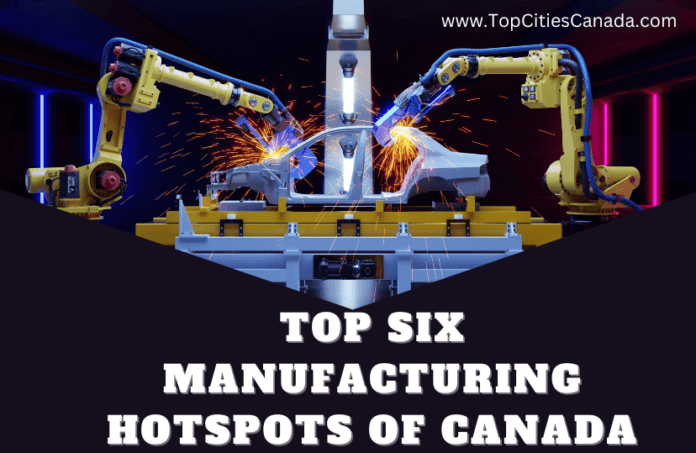Canada’s manufacturing sector plays a vital role in strengthening the national economy. It supports millions of jobs, boosts exports, and fuels innovation across multiple industries. From advanced manufacturing and aerospace to food processing and clean technology, different regions across Canada specialize in unique manufacturing strengths.
This article explores Canada’s major manufacturing hubs and explains how each contributes to economic growth at the regional and national levels.
Overview: Manufacturing in Canada
Manufacturing is one of the pillars of Canada’s economy, contributing approximately $185 billion to GDP and supporting nearly 1.7 million jobs nationwide. The sector accounts for nearly $360 billion in exports, making it a cornerstone of Canada’s global trade presence.
Each region of the country specializes in different industries, creating a diverse and resilient manufacturing ecosystem.
Ontario: The Heart of Canadian Manufacturing
Toronto – Advanced Manufacturing Hub
Toronto is Canada’s largest manufacturing center, known for innovation, technology, and high-value production.
Key Manufacturing Sectors:
Automotive & Electric Vehicles: Major operations by global automakers and suppliers
Aerospace Components: Aircraft parts and advanced engineering systems
Consumer Goods: Electronics, appliances, and household products
Economic Impact:
Toronto contributes significantly to Ontario’s GDP through advanced manufacturing.
The region’s manufacturing growth has consistently outpaced national averages.
Strong collaboration between industry, research institutions, and innovation hubs fuels productivity.
Employment Impact:
High-paying jobs in engineering, automation, and technology
Strong indirect employment across logistics, research, and supply chains
Hamilton – Canada’s Steel Capital
Hamilton is globally recognized for its steel manufacturing industry.
Key Products:
Hot-rolled, cold-rolled, galvanized, and pre-painted steel
Steel products used in construction, automotive manufacturing, and packaging
Innovation in Sustainability:
Transition toward low-carbon steel production using Direct Reduced Iron (DRI) and Electric Arc Furnace (EAF) technology
Major reduction in greenhouse gas emissions
Economic Contribution:
Steel manufacturing contributes billions to the regional economy
Supports thousands of skilled trade and engineering jobs
Industrial Impact:
Strengthens Canada’s infrastructure and manufacturing supply chains
Encourages industrial diversification and innovation
Quebec: A Powerhouse of Aerospace and Advanced Manufacturing
Montreal – Global Aerospace Hub
Montreal is one of the world’s top aerospace manufacturing centers.
Key Industries:
Aircraft manufacturing (Bombardier and suppliers)
Aerospace engineering and avionics
Research and development in aviation technologies
Economic Impact:
The aerospace sector generates billions in economic output
Employs tens of thousands of skilled workers
Attracts international investment and global partnerships
Global Competitiveness:
One of the few cities worldwide with a complete aerospace supply chain
Strong focus on innovation and high-value manufacturing
Quebec City – Food and Pharmaceutical Manufacturing
Quebec City has a strong industrial base focused on food production and pharmaceuticals.
Key Products:
Processed foods and beverages
Dairy and agricultural products
Pharmaceuticals and health-related products
Economic Contribution:
Supports rural and urban economies through food processing
Strengthens provincial exports and food security
Job Creation:
Offers employment across skill levels, from production to advanced scientific research
Western Canada: Innovation and Resource-Based Manufacturing
Edmonton – Energy and Food Manufacturing Hub
Edmonton plays a crucial role in Alberta’s manufacturing economy.
Key Manufacturing Sectors:
Petroleum refining and petrochemicals
Beverage and food processing
Economic Significance:
Strong connection to Alberta’s natural resources
Major contributor to domestic and export markets
Employment Impact:
Provides stable jobs across technical, skilled trade, and professional roles
Vancouver – Sustainable and Green Manufacturing
Vancouver is known for its environmentally focused manufacturing sector.
Key Industries:
Food processing and seafood production
Clean technology and environmental solutions
Economic Contribution:
Supports sustainable production practices
Strengthens exports to global markets
Innovation Leadership:
Home to companies developing green technologies
Attracts eco-conscious investment and talent
Manufacturing’s Role in Canada’s Economy
Manufacturing remains a backbone of Canada’s economic strength by:
Contributing over $185 billion annually to GDP
Supporting 1.7 million jobs nationwide
Driving exports worth $360 billion annually
Encouraging innovation through research and development
Strengthening regional economies and supply chains
Conclusion
Canada’s manufacturing sector is diverse, resilient, and essential to the nation’s economic success. From Ontario’s advanced manufacturing hubs and Quebec’s aerospace leadership to Western Canada’s resource-based and green industries, each region plays a vital role in shaping the country’s industrial future.
As global demand evolves, Canada’s strong manufacturing foundation ensures continued growth, innovation, and global competitiveness making it one of the most dynamic industrial economies in the world.











